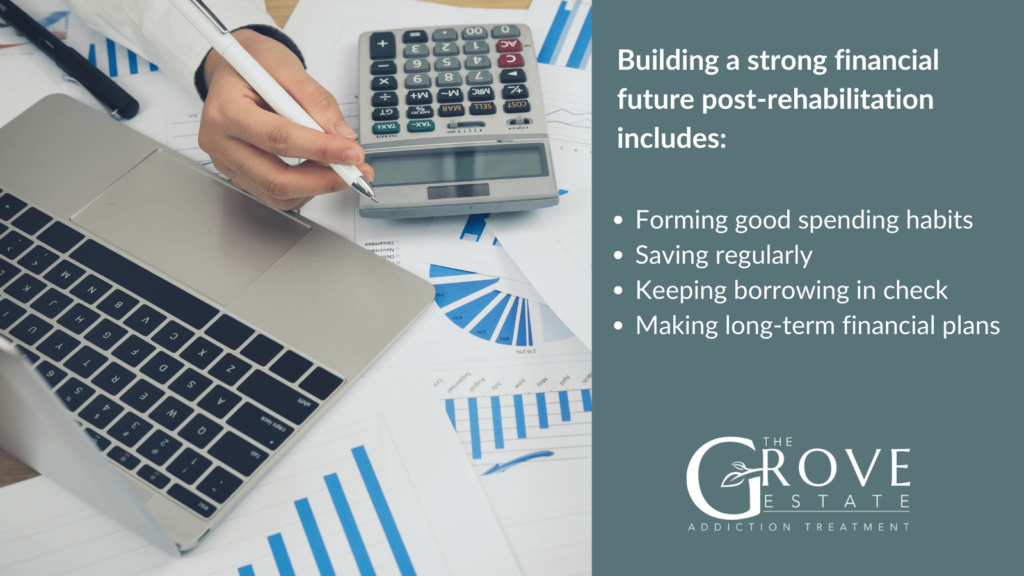Addiction rehab loan is a way of financing addiction treatment programs, guaranteeing that costs won’t be an obstacle to individuals in a recovery process.
Insurance plans often cover a portion of addiction treatment but when it is insufficient, personal loans, bank loans, and credit cards offer diverse financing options for substance abuse treatment. Alternative funding sources for addiction treatment include grants, scholarships, community support, crowdfunding, etc.
Post-treatment financial management is crucial, involving budgeting for loan repayment, understanding options during financial hardship, and consulting with financial advisors for effective financial strategies.
What Are The Options For Financing Drug Rehab?
Understanding the various financing options for drug rehab is crucial for accessing timely and effective treatment. Personal loans often provide a quick and private way to fund addiction treatment, offering flexible repayment terms and wide acceptance across numerous rehab centers. This option ensures that treatment is accessible immediately when other funding sources fall short.
However, if a low credit score prevents securing a personal loan, there are still viable alternatives to consider. Options such as bank loans, low-interest credit cards, and healthcare credit cards with deferred interest rates can also facilitate funding for rehab. These financial tools can help navigate the journey to the right treatment center, ensuring that financial constraints do not delay necessary addiction treatment.
What are the Basics of Substance Abuse Treatment Loans?
When other funding sources fall short, substance abuse treatment loans, as specialized financing options, come into play for addiction treatment. Think of these loans as a tailored suit, fitting your specific financial needs and covering your treatment costs entirely, from insurance deductibles to other out-of-pocket expenses. They are multipurpose and can cover various medical expenses, including treatment at rehab centers. They offer a targeted solution for managing treatment finances, especially when insurance falls short.
These loans can be acquired either directly through lenders or by utilizing programs offered by addiction treatment facilities. The forms of drug rehab financing options include various sources such as personal loans, bank loans, and even using credit cards for financing addiction treatment. But before applying for a loan, consider the level of care required, balancing the costs between residential and outpatient services to make an informed financial plan.
Once approved, borrowers can receive funds through a check or ACH deposit within days, allowing rapid access to needed treatments.
How Do You Qualify for a Personal Loan?
Securing a personal loan for addiction treatment requires certain qualifications, much like needing a ticket to board a train. A good credit history is necessary to demonstrate to lenders your capability of repaying the loan. Your credit report and score are like your ID card in the loan world, influencing your eligibility and potential interest rates. Sufficient income is another vital qualification criterion, as lenders require proof that you can make loan payments.
There are many stations where you can buy your ticket. Lenders such as:
- LightStream
- SoFi
- Upgrade
- Upstart
offer personal loans for rehab costs, presenting different terms and benefits to potential borrowers. But remember, choosing the right loan is like choosing the right train – it’s not just about the destination, but also about how comfortable and affordable the journey is. That’s where comparing loan terms and interest rates comes in.
Comparing Loan Terms and Interest Rates
Various factors such as down payment, credit score minimums, and debt-to-income ratios directly affect loan affordability and accessibility. Consulting with knowledgeable lenders can provide clarity on the qualifications and benefits of each loan option, aiding in an informed decision.
The key factors to consider when choosing a loan for rehab are:
- The interest rate, which determines the cost of borrowing
- The loan term, which affects the monthly payment amount and the total sum paid over its lifespan
- The time-to-funding, as quick access to loan funds can be crucial for timely treatment initiation

What Are the Roles of Insurance Programs in Addiction Treatment?
Similar to a safety net, insurance programs are there to catch you when you stumble. Most private insurance plans cover at least a portion of substance abuse treatment, making them a significant pillar in the structure of rehab financing. The major health insurance companies in the United States, such as United Healthcare, Cigna, Blue Cross and Blue Shield, and Aetna, include coverage for addiction treatment as part of their plans. This coverage is an important resource for individuals seeking help for substance abuse issues. Thanks to the Affordable Care Act (ACA), policies cover between 60 to 90% of rehab service costs depending on the selected plan, including services such as psychotherapy, counseling, and inpatient mental and behavioral health services.
Public healthcare options like Medicare and Medicaid offer another safety net for eligible individuals, covering at least part of substance misuse treatment. Medicare provides coverage for drug and alcohol rehab treatment, including inpatient and outpatient programs, medications, and partial hospitalization treatment. If you’ve recently ended your employment, the Consolidated Omnibus Budget Reconciliation Act (COBRA) allows you to continue your employer-based health insurance coverage for substance use disorder treatment.
But sometimes, even a safety net can have holes. That’s where maximizing your health insurance benefits and exploring gap financing options when insurance falls short can ensure you land safely.
How Do You Maximize Your Health Insurance Benefits?
For a maximized safety net, a thorough understanding of its dimensions is necessary. Here are some steps to help you make the most of your insurance benefits:
- Review and understand the specific substance use disorder coverage of your insurance plan.
- Select a provider that is in-network with your insurance carrier to maximize your benefits.
- If you prefer a treatment center that isn’t within your insurer’s network, inquire about your insurance plan’s out-of-network benefits.
Partnering with Treatment Centers for Financial Assistance
Consider how partnering with a friend has helped you solve a challenging puzzle before. Together, you found solutions that you wouldn’t have thought of on your own. Similarly, partnering with treatment centers for financial assistance can provide access to:
- Internal financing options like payment plans and sliding scales based on income, making treatment more affordable
- Guidance in the acquisition of loans for rehab treatment
- Financial counseling to help navigate these options
Treatment centers can aid patients by providing a comprehensive treatment program, resources, and support.
Navigating payment plans with rehab facilities and seeking financial counseling from treatment providers can be two pieces of this puzzle that you solve together.

How Do You Navigate Payment Plans with Rehab Facilities?
Payment plans and sliding scale fees act as beacons, leading you to affordable treatment. Addiction treatment facilities may offer these financing options, ensuring accessibility and affordability of treatment. The setup of these payment plans typically entails assessing the patient’s financial condition, after which a feasible schedule for payment installments is agreed upon.
By combining payment plans with other financing methods, you effectively manage the overall cost of addiction treatment and spread it over time.
What are the Alternative Funding Sources for Substance Abuse Treatment
Should you require additional resources to traverse the intricate landscape of rehab financing, that’s where alternative funding sources come into play. That’s where alternative funding sources for substance abuse treatment come in. State governments and local municipalities provide funding for alcohol and drug treatment in the U.S. Government grants and state-funded rehabilitation centers provide public assistance options for covering addiction rehab costs. These programs offer a range of care options, including outpatient and inpatient services, and ongoing aftercare support..
On the other hand, private financing options for addiction treatment include:
- Personal savings
- IRA
- 401(k) plans
- Home equity
- Private scholarships
Assets such as savings accounts, retirement plans, and home equity may be utilized to help finance addiction treatment. Financial advisors can assist individuals in developing a diversified strategy for financing rehab, which may include loans, personal savings, and other assets.
Grants and Scholarships: Free Money for Treatment
Consider grants and scholarships as complimentary passes to your recovery journey. SAMHSA grants, provided through the Mental Health Services Administration and block grants mandated by Congress, offer federal funding for state drug and alcohol rehabilitation programs. The Substance Use Block Grant (SUBG) program provides funds and technical assistance for activities to prevent and treat substance use, enhancing public health and substance abuse prevention.
Block grants can be used to supplement Medicaid, Medicare, and private insurance services, especially beneficial for uninsured individuals or those with temporary coverage gaps. Non-profit organizations like 10,000 Beds have provided over $1,000,000 in financial support for substance abuse rehab through scholarships. Various non-profit organizations target funding specifically for substance abuse treatment to individuals who meet qualifying criteria.
Crowdfunding and Community Support
Visualize a collective rallying to back your recovery journey. That’s the power of crowdfunding and community support. Crowdfunding platforms such as GoFundMe allow individuals seeking addiction treatment to raise funds when traditional financing options are insufficient.
Community support can be garnered through various initiatives like sharing personal recovery stories, organizing tribute events, and hosting athletic challenges to raise awareness and funds for addiction treatment. Successful community support and crowdfunding campaigns are characterized by setting a financial target, regularly updating supporters on progress, and expressing gratitude for every donation made towards the addiction recovery cause.
How Do You Manage Repayment Post-Treatment?
Arriving at the recovery destination doesn’t spell the end of the journey. There’s still the journey back home – managing repayment post-treatment. Creating a budget after addiction treatment helps to manage personal finances by monitoring income versus expenses and establishing financial boundaries. Prioritizing debt repayment by focusing on high-interest debts or the smallest balances first is vital to rebuilding credit and lessening financial stress after treatment.
Building a strong financial future post-rehabilitation includes:
- Forming good spending habits
- Saving regularly
- Keeping borrowing in check
- Making long-term financial plans
But what if you face financial hardship during the repayment process? Options like deferment, forbearance, and income-driven repayment plans can provide temporary relief for loan payments.

What Are the Options for Financial Hardship?
At times, the voyage back home can pose as much of a challenge as the recovery journey itself. But there are resources available to help you navigate this path. Deferment and forbearance are financial hardship options that allow temporary suspension of loan payments, but may lead to higher total loan costs due to interest accumulation.
Applying for forbearance or deferment can be accomplished through various means such as a loan servicer’s website, by mail or email with required forms, or over the phone. Income-driven repayment plans offer an adjustment of monthly loan payments according to income and family size, potentially reducing payments to as low as $0 per month.
What is the meaning of rehabilitation from a substance?
Rehabilitation from a substance refers to the treatment process for individuals struggling with drug and/or alcohol addiction, which can involve medical treatment and psychotherapy. The Substance Abuse and Mental Health Services Administration reported that over 20 million people needed substance abuse treatment in 2015.
How can personal loans help finance addiction treatment?
Personal loans can help you cover the entire cost of addiction treatment, including insurance deductibles and other out-of-pocket expenses.
Can rehab loans cover the costs of specialized rehab programs?
Rehab loans are designed to provide financial assistance for those seeking treatment for addiction, including specialized rehab programs. These loans can help cover the comprehensive costs associated with detoxification, residential treatment, intensive outpatient programs, and even luxury rehab facilities. Each of these specialized programs comes with its own set of costs, determined by factors such as the intensity of medical support, amenities offered, length of program, and location. The flexibility of rehab loans ensures that individuals can choose the program that best fits their recovery needs without the stress of financial constraints.
Understanding how rehab works is crucial since there are specialized addiction treatment programs as well as varying levels of intensity based on the severity of symptoms. Detoxification, residential care, and outpatient services offer tailored treatment approaches that can significantly impact recovery outcomes and the associated costs. Additionally, holistic therapies often complement these programs, providing a comprehensive approach to treatment. For those considering integrating holistic therapy into their recovery plan, rehab loans can offer the financial support needed to access these beneficial services. Whether it’s acupuncture, yoga, or art therapy, incorporating holistic methods can enhance the rehab experience and support long-term recovery.

Share This Post



